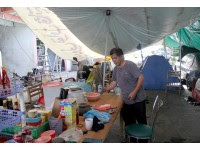
DAWEI, Myanmar: Thousands of supporters in Myanmar’s countryside cheered opposition leader Aung San Suu Kyi during her first campaign tour for parliament Sunday, highlighting how quickly and dramatically politics is changing in this long-repressed Southeast Asian nation.
Throngs of people crowded the airport to greet Suu Kyi in the southern town of Dawei and lined the roads shouting: “Long Live Daw Aung San Suu Kyi!” “Daw” is a title of respect in Myanmar.
Many waved bouquets of flowers, and some hoisted babies on their shoulders to glimpse the Nobel Peace laureate, who is revered as Myanmar’s icon for democracy. Banners with pictures of Suu Kyi decorated the town.
“People had been afraid to discuss politics for so long,” said Aung Zaw Hein, an environmental activist. “Now that she’s visiting, the political spirit of people has been awakened.”
Suu Kyi, 66, has devoted much of her life to the struggle against authoritarian rule, but spent 15 of the past 23 years under house arrest and has never held elected office. If she wins, Suu Kyi will have limited power in the legislature, which remains dominated by the military and the ruling party, but victory would be highly symbolic and give the longtime political prisoner a voice in government for the first time.
The one-day campaign stop in Dawei follows a series of unprecedented reforms enacted by the nominally civilian government that took over when a military junta ceded power last year. The government has released hundreds of political prisoners, reached cease-fire deals with ethnic rebels, increased press freedoms and eased censorship laws.
The April 1 by-election is being held to fill 48 seats in the lower house of parliament that were vacated after lawmakers were appointed to the Cabinet and other posts last year.
Her party boycotted the last vote in 2010, but registered earlier this month for by-elections after authorities amended electoral laws, enabling her party to legally participate.
The Election Commission must still accept Suu Kyi’s candidacy. A ruling is expected in February.
Suu Kyi is hoping to run for representative for the constituency of Kawhmu, a poor district just south of Yangon where villagers’ livelihoods were devastated by Cyclone Nargis in 2008.
The vote is being closely watched at home and abroad because it is seen as a crucial test of the regime’s commitment to change.
Suu Kyi, who won the Nobel Peace Prize in 1991 for her nonviolent struggle for democracy, has rarely traveled over the last two decades outside Yangon, the country’s main city.
Although she conducted one successful day of rallies in two small towns north of Yangon last August, a previous political tour to greet supporters in 2003 sparked a bloody ambush on her convoy that saw her forcibly confined to house arrest at her lakeside home.
Suu Kyi was finally released from house arrest in late 2010, just days after the country’s military rulers organized elections widely viewed as neither free nor fair.
In Dawei, a coastal town south of Yangon, Suu Kyi will campaign on behalf of another candidate running for a parliament seat, party spokesman Nyan Win said.
She will make similar campaign trips to other Burmese towns, including the country’s second city, Mandalay, in early February before campaigning for her own seat, Nyan Win said.
In Dawei, Suu Kyi will meet party supporters and conduct rallies. The town is home to activists who recently helped persuade the government to ditch construction of a 4,000-megawatt coal-fired power plant over environmental concerns.
A 400-megawatt coal plant is still planned, however, because it will be needed to fuel a massive industrial complex project that includes construction of a deep sea port, a steel mill and a petrochemical plant. The project also includes railroads and highways that will connect Burma’s coast directly to Thailand and the rest of Southeast Asia.
Dipetik dari - Arab News








